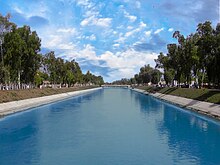|
Bhakkar
Bhakkar (Urdu: بھكّر) is the principal city of Bhakkar District, Punjab, Pakistan. It lies on the left bank of the Indus River. It is the 86th most populous city in Pakistan. AdministrationBhakkar is the administrative centre of Bhakkar Tehsil, which is one of the four tehsils of the district. Bhakkar Tehsil is subdivided into 17 union councils, three of which form the city of Bhakkar.[2] HistoryBhakkar was founded probably in late fifteenth century by a group of colonists from Dera Ismail Khan, and is named after Bakhar Khan.[3][4] It came under Humayun's rule after he restored the Mughal Empire in 1555 and appointed Khan Khanan as the governor of the city alongside Multan,[5] as Multan was a province of the Mughal empire that included the city of Bhakkar.[6] Fray Sebastian Manrique, a 17th-century Portuguese traveller, visited the city in 1641 and described it as the capital of Kingdom of Bhakkar.[7]  British ruleDuring British rule, Bhakkar Town was part of Bhakkar Tehsil in Mianwali District. It was located on the left bank of the Indus River, and the North-Western Railway line passed through it.[4] The Imperial Gazetteer of India described the town as follows:
Notable placesDilkusha BaghDilkusha Bagh is an old date orchard in Bhakkar. It is believed to be a Mughal garden built by Humayun or Akbar. It is home to hundreds of rare date cultivars, along with its common Basra dates.[8] Karna oilBhakkar is known for production of Karna oil from Karna flowers. The flowers are used in a multitude of ways, but the most common use is to make oil. Its essence is extracted and added to mustard oil while cloves, cardamom, jasmine and other spices are also added to the mixture. The resulting product is called ‘karna oil’ and is thought to be a quality product for treating a wide array of hair-related issues such as dandruff and unnecessary shedding.[9] References
Bibliography
External links |
||||||||||||||||||||||||||||||

